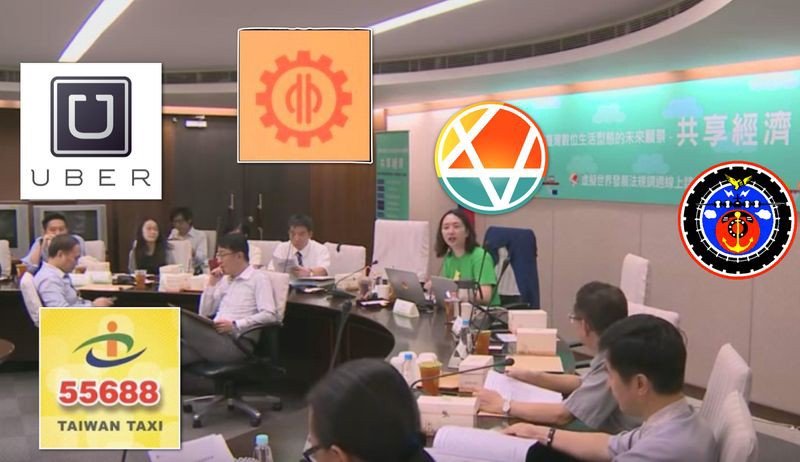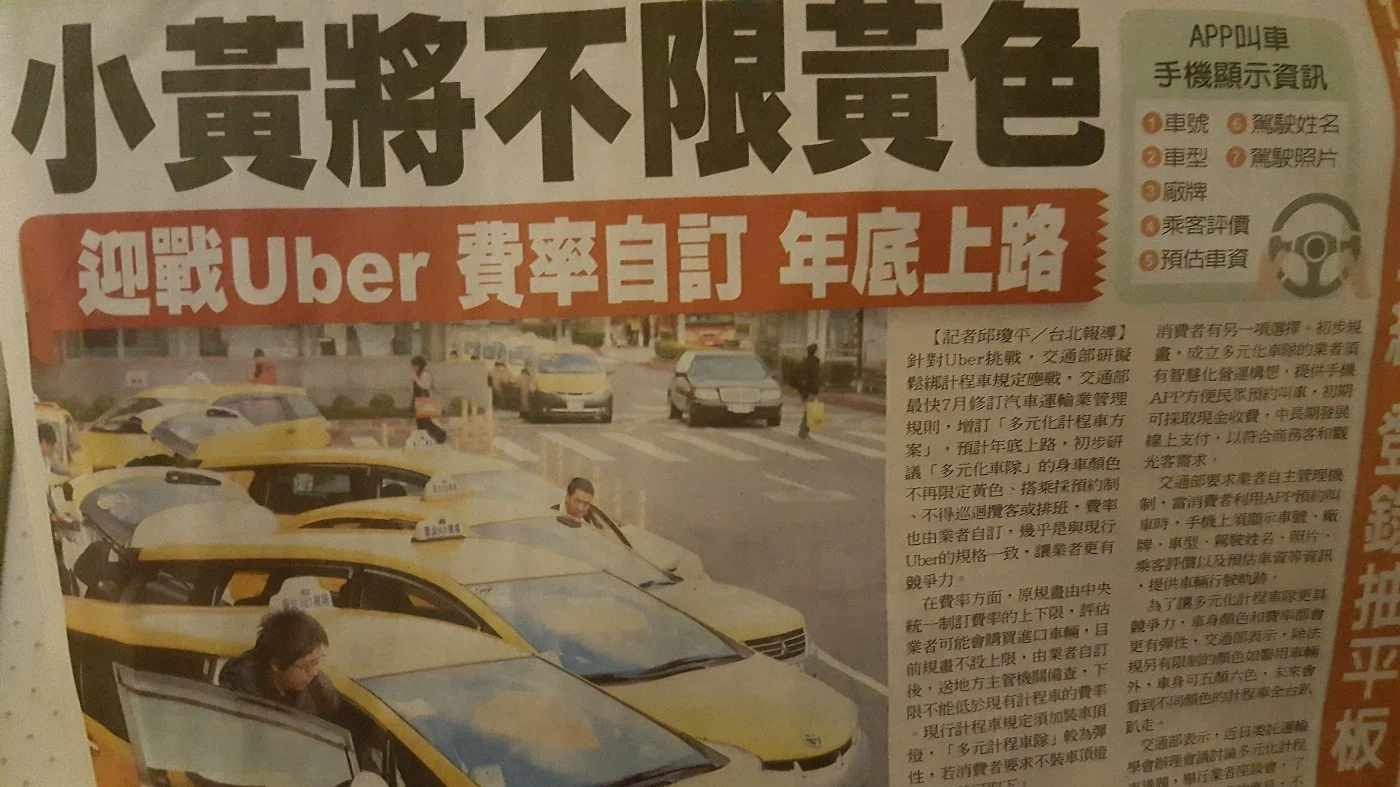
Real-World Examples
Highlighting Case Studies and Real World On-The-Ground Examples of Co-Intelligence
Two Examples of Wisdom & Resourcefulness
vTaiwan: Tapping the Wisdom & Resourcefulness of the Whole
This case study describes how vTaiwan mobilized hundreds of Uber and taxi drivers and their passengers for a month of quickie deliberations to solve together “the Uber problem” in Taiwan. – Tom Atlee
THE UBER POL.IS EXERCISE
Edited from the following three sources:
https://blog.pol.is/uber-responds-to-vtaiwans-coherent-blended-volition-3e9b75102b9b
http://www.outrightusa.org/2017/05/transgender-anarchist-genius-solved-uber-problem-taiwan
https://www.youtube.com/watch?v=ZcYg7z-mwKk&feature=youtu.be
and verified by Audrey Tang
As in other countries, Uber was a challenge for taxi companies and government regulators in Taiwan. vTaiwan undertook to facilitate a resolution in 2015.
Usually the vTaiwan process requires a full range of domestic stakeholders to show up as part of the working group undertaking a vTaiwan project. Not being a Taiwanese company, Uber could and did choose to ignore the process at first. In addition, no ministry wanted to initiate Uber as a vTaiwan topic. The Ministry of Transport saw Uber people as criminals. The Ministry of Economic Affairs didn’t consider Uber an e-commerce company. The Ministry of Finance had never worked with “sharing economy” activities.
So instead of focusing on Uber (the company) and various ministries, vTaiwan decided to engage all Uber drivers, taxi drivers and their passengers. These stakeholders were concentrated in Taiwan’s two largest cities and almost all used mobile phones. Because these drivers’ attention is so focused on driving, vTaiwan designed its process so that engagement required no more than 5 seconds at a time, instead of the usual minute.
They set things up so that all four stakeholder groups were sent a text message simultaneously containing a URL for a page containing an instant briefing and survey question – “Is it ok for private non-professional license people to carry passengers and charge them for it?” – noting that their responses would create the agenda that major stakeholders would talk about in a live-streamed debate a month later. For the process to work, all four groups needed to participate in a pol.is exercise during the same hour of each day. The exercise was run every day for four weeks, during which time the responses evolved noticeably. The four groups were promised that at the end the open data would be published for independent analysis and that the stakeholder deliberation would take place.
During each day’s exercise what participants saw on their phone was one random sentiment from a fellow citizen beginning with “I feel“ – e.g., “I feel passenger insurance is very important“. They took one second to press “I agree“ or “I don’t agree“ and that was it. Their vote automatically moved the position of their avatar in the online landscape of opinions into a group that more or less agreed with them. If they wished, they could then offer their own “I feel” statement in response.
The exercise began with participants divided into the four stakeholder groups – taxi drivers, Uber drivers, taxi passengers and Uber passengers. The pol.is program displayed how other people in their group and in other groups felt about each statement, first presenting statements with the most support within their group. The most inclusive statements agreed among all groups were available in a “Majority Opinion” tab.
Very soon after the pol.is exercise started, the four groups evolved into two, in which the dominant consensus statements were at radical extremes, anti-Uber and pro-Uber. 75% of Group 1 agreed with the statement “Since the Ministry has already rejected Uber’s administrative appeal, I think Taipei city government should cancel the company registration of ‘Taiwan Uber Inc.” – in other words, “We don’t negotiate with criminals.“ At the other extreme, 77% of Group 2 favored “Even if there are a lot of taxis in the street, I will still call Uber.“ Although these were minority opinions across all participants, they were defining majorities within their opinion sub-groups.
The online opinion space was at first mapped out using the yes/no votes on these two extreme statements as the x and y axes. That changed as people proposed other statements for other people to vote on, making the online opinion space very dynamic, continually changing as people responded to each other’s ideas.
And by rewarding arguments that gained support from one’s own group as well as from other groups, participants were led to invent more moderate or creative ideas to gain greater agreement. After about a week the two opposing groups each developed a more moderate consensus statement. And by the end of the second week the process began to identify the first majority consensus statements – i.e., ideas that a healthy majority agreed on regardless of which group they were part of. This consensus-evoking process started with some very general reflections like: “The laws will change with time“ and evolved into more specific but still general proposals like “Although there are many important topics, the security of passengers is the most important one.“
After another week people started to propose concrete solutions or ideas to garner across-group support. For example, everyone (even Uber themselves) agreed that “We should introduce the same five-star rating system to order taxis because the thing that ensures Uber’s quality is its rating system. It is not anything else. So if the government mandates all the independent taxis and fleets to introduce the same system, we can get the same quality and then Uber doesn’t become a problem.“
Over time the initial polarized statements got less and less support and became more conditional. During the second half of the polling period more people figured Taiwan should negotiate with Uber rather than dismissing them as criminals.
Experience told vTaiwan activists that on the fourth week people would finally start to agree on things that were actionable. Before that they usually found just random reflections or general observations. After trying to convince each other so hard because the system showed ideas with the highest score, people started to come up with good policy ideas like the following:
* “You should be fair to both Uber and non-Uber drivers“
* “The taxation is very important. Uber must register and their registration must display prominently on their window, or in their cars“
* “This is not just a commerce because like medicine and food this is matter of public safety and if people want to avoid tax and really want ride sharing, you should insure the people”
* “If you go to work and go back from work you should only ride two times. It is okay to evade tax like that. But if you take more than two routes then of course you are actually making a living out of it and you’re a business person.“
* “The taxi driver should be allowed to join multiple platforms, even existing taxi drivers.“
These suggestions had over 80% consensus which was vTaiwan’s cut-off point to become the agenda for the subsequent deliberation. Before they did the deliberation they did a comparative analysis using the pol.is data and then showed what other countries were doing based on the suggestions. Then, in the deliberations, they asked each stakeholder whether they wanted to compromise or not.
Audrey Tang facilitated the two-hour face-to-face deliberation meeting with Uber, academics, industry representatives and government officials. But instead of taking place behind closed doors, as such meetings normally do, it was live streamed and live-transcribed, with 1,875 people watching. Faced with such clear public pressure, and knowing there was a real consensus behind the demands, all stakeholders displayed a remarkable willingness to cooperate and work with each other. Notably, they made the following concessions:
* Uber agreed to provide its international liability insurance policy and, if needed, release it for public review (something they hadn’t done in any other non-US country).
* Uber agreed to coach all drivers to register and obtain professional driver’s licenses.
* If legalized in some areas, Uber was willing to pay for UberX car permits, as well as transport taxes.
* The Taipei Taxi Association expressed a willingness to work with the UberTAXI platform under mutually-agreeable terms about who would get how big a cut of the fares.
* The Taiwan Taxi Fleet promised to offer better services, if taxi pricing could increase in response to market demands.
* The taxi fleet said that if there were open search pricing then they would introduce the new class of taxis that would compete directly with Uber. Then the Minister of Transport said: “Okay, we will do that.“
Uber promised its drivers would get insurance and professional driver’s licenses, stop undercutting standard fare structures, and submit ride data to the Taiwanese authorities. Other changes, aimed at making it easier for civil society to start up its own Uber variants, were also agreed. These points were ultimately all incorporated in a new law. Basically the whole process clarified specific standards through which Uber could become legal in Taiwan. Uber agreed to more than half of the original demands during the deliberations and over the next couple of years negotiated enough of the rest to be able to legally operate in Taiwan. (see http://focustaiwan.tw/news/asoc/201710300027.aspx)
This four-week process – involving 4,500 people, including users and drivers of both Uber and traditional taxis – worked because it nudged people towards consensus. More extreme statements – such as, “the government should do nothing about Uber” – were rejected, and contributors were encouraged to put up more nuanced ideas. Eventually this yielded the recommendations that were each backed by over four-fifths of the contributors. It is also important to realize that the three ministries involved were able to save face by quietly putting their concerns into the initial pol.is conversation where people voted on all ideas equally rather than taking a public stand right at the start. (Another interesting dynamic was that the Airbnb people were watching the live stream all the time, which led to subsequent explorations of their activities – but that is another story….)


